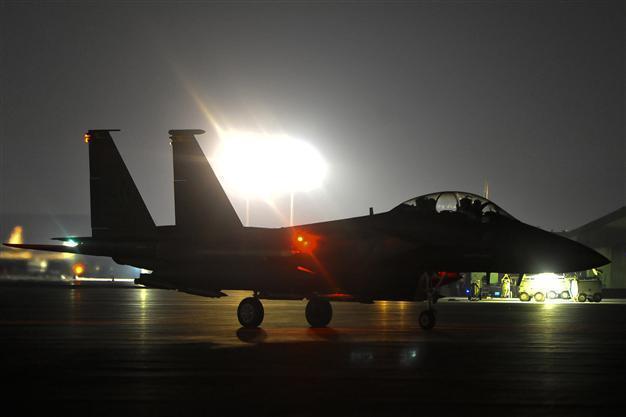US-led raids hit jihadist oil as al-Nusra threatens reprisals
DAMASCUS - Agence France-Presse

In this Sept. 23 photo provided by the U.S Air Force, an F-22A Raptor taxis in the U.S. Central Command area of responsibility prior to strike operations in Syria. AP Photo
U.S.-led warplanes kept up strikes on oil sites funding the Islamic State of Iraq and the Levant (ISIL) group Sept. 28, as al-Qaeda’s Syria affiliate threatened reprisals after a key operative was reported killed.
The coalition raids destroyed three makeshift oil refineries in jihadist-controlled territory in Syria, intensifying efforts to deny ISIL, also known as Islamic State (IS), funding after a wave of strikes on its oil infrastructure on the night of Sept. 25.
The coalition strikes hit close by the Turkish frontier, near Tal Abyad just across the border from the Turkish town of Akçakale, the Syrian Observatory for Human Rights said.
“At least three makeshift refineries under IS control in the Tal Abyad region were destroyed,” the Observatory said. “IS had been refining crude and selling it to Turkish buyers,” claimed the Britain-based watchdog, which has a broad network of sources inside Syria.
Before the launch of U.S.-led air strikes on ISIL in Syria on Sept. 23 analysts say the jihadists were earning as much as $3 million (2.4 million euros) a day from oil revenues.
The strikes around Tal Abyad came after raids on Sept. 27 near the mainly Kurdish town of Ain al-Arab, also very close to the Turkish border.
The town, known as Kobane in Kurdish, has been under assault by ISIL for more than a week, sparking an exodus of at least 160,000 refugees into Turkey.
The coalition also kept up its raids on the jihadist heartland province of Raqa in the early hours of Sept. 28 as it pressed what Washington says are “near continuous” strikes.
Multiple European governments, meanwhile, have approved plans to join the air campaign in Iraq, including most recently Britain. British fighter jets flew their first combat mission over Iraq on Sept. 27but returned to base in Greek Cyprus without firing a shot.
European governments have resisted joining the U.S.-led air campaign in Syria for fear of getting embroiled in the more than three-year-old civil war, forcing Washington to rely on Arab allies Bahrain, Jordan, Qatar, Saudi Arabia and the United Arab Emirates.
Al-Nusra vows to reciprocateThe opening salvo of the U.S.-led bombing campaign in Syria actually targeted not ISIL but its jihadist rival al-Qaeda and drew a threat of retaliation on Sept. 27 after one of its leaders was reported killed.
“These states have committed a horrible act that is going to put them on the list of jihadist targets throughout the world,” said spokesman Abu Firas al-Suri in a video posted online.
“This is not a war against Al-Nusra, but a war against Islam.”
Al-Qaeda loyalists of Al-Nusra Front, who are prominent on the battlefield across much of western Syria, have been at sometimes deadly loggerheads with ISIL since the Al-Qaeda leadership disavowed the group’s commanders in February.
But the group has still been targeted by the U.S.-led air campaign which has killed at least 57 of its fighters, according to the Observatory.
Washington has made a distinction between the wider Al-Nusra Front and a cell of foreign fighters dubbed the Khorasan Group that it says was plotting attacks against the United States.
Muhsin al-Fadhli, a long-standing al-Qaeda operative and alleged leader of Khorasan, was killed in the strikes, according to a jihadist who fought with the group.
The SITE monitoring group said a series of Tweets from the jihadist expressed condolences for the deaths of Fadhli and another Khorasan leader, Abu Yusuf al-Turki.
